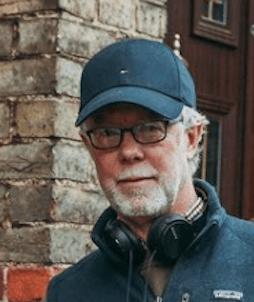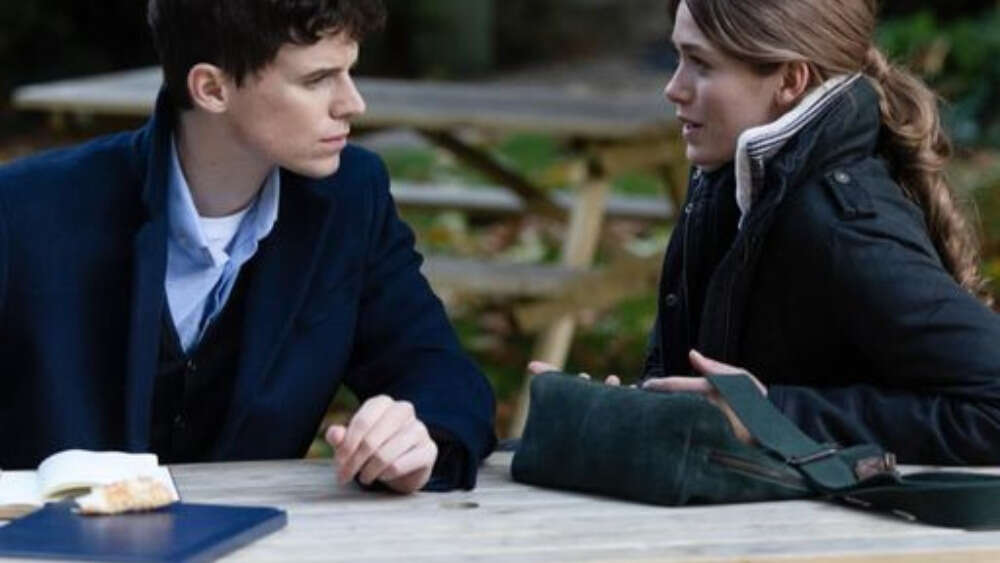The team behind the new faith-based film Surprised by Oxford wrestled long and hard about how explicit to make the story of a university student’s journey to Christian faith.
Ultimately, they decided to go with a more oblique approach in adapting Carolyn Weber’s beloved memoir to film, in the hope that it would reach both a Christian and non-Christian audience.
Responding to Eternity’s review of the film, which questioned leaving Jesus out of the equation in Caro’s spiritual awakening, producer Ken Carpenter confessed that he didn’t know if it was the right decision.
“We elected to be purposefully a little more oblique in the spirit of letting her joy-filled journey be an attraction to learning more.” – Ken Carpenter
Speaking to Eternity via Zoom from his home in Nashville, Tennessee, Carpenter said it was legitimate for those who loved the book to question the choice to make Caro’s journey less about finding Jesus and more about finding romantic love.

Ken Carpenter
“I can assure you that we wrestled long and hard with the integration of different elements of Carolyn’s story into this filmed adaptation of her book,” he said.
“Look, it’s a tricky proposition to adapt any book. Carolyn’s book is a fully embodied 400-page memoir that covers so much territory. The notion of distilling that down to an hour-and-a-half-ish movie is quite a big undertaking.
“I will tell you that there were earlier drafts that may have been a little more direct about Carolyn’s faith transformation. In the end, with lots of reflection about the responsible handling of the telling of this story, we elected to be purposefully a little more oblique in the spirit of letting her joy-filled journey be an attraction to learning more.”
“I find myself almost daily involved in these provocative, evocative explorations of what is a rightful handling of this tricky terrain.”
This story chronicles a Canadian student’s conversion to the Christian faith while studying for a Master’s in English at the University of Oxford – the same university where C.S. Lewis studied, taught and became a Christian. Carpenter said he had fallen in love with the script when he first read it a few years ago. It had been a “long and arduous journey” to get the film made in Oxford against the backdrop of a global pandemic. But, he said, the project carried great significance for himself and the core team led by writer and director Ryan Whitaker.
“We wanted to tell the story in the most integral and accessible way possible that might find it reaching both [Christian and non-Christian audiences] – that’s a lofty goal. And a lot of films miss the mark entirely by not really knowing who they’re designed for. But, somehow, we felt that this material might allow us to navigate a middle ground,” he explained.
Every day in Nashville, he said, people in coffee shops were discussing how to tell faith stories to a mainstream audience in a way that turns people on and not off.
“Nashville is, in many respects, an epicentre of faith-based media. Of course, the contemporary Christian music industry is anchored here, as is much of Christian book publishing and social media influencing. And now, a robust faith-adjacent film community has emerged in this town.
“And so every day, in coffee shops throughout town, I’m running into, and having the privilege of dialoguing with, all kinds of artisans who are at the intersection of making art and reflecting their faith. And trying, admittedly, to make a living. I find myself almost daily involved in these provocative, evocative explorations of what is a rightful handling of this tricky terrain.”
“We may have the privilege of doing a piece of work wherein the aroma of Christ might invite people to deeper explorations.”
Carpenter said some of his friends and colleagues felt compelled to “ask for the order” after clearly presenting the path to the gospel. But he believed in a continuum encompassing many different expressions of Christian faith that could ultimately propel audiences to learn more about the truth of Christ.
“There’s plenty of room and a need for films and stories that serve a seed-planting purpose, and those I think are even trickier to handle responsibly. I believe that if we build the right team and if we bring a high commitment to God-honouring artistic excellence, we may have the privilege of doing a piece of work wherein the aroma of Christ might invite people to deeper explorations. That’s the hope, that’s the intent. And that’s not easy, but I am of the persuasion and of the conviction that there’s a real need for that.”
While Caro’s moment of conversion is glossed over in the movie, Carpenter said there were clues to her transformation, such as the references to C.S. Lewis, who chronicled his reluctant conversion to Christianity in Surprised by Joy.
“When the lovely Phyllis Logan from Downton Abbey assures Caro that there’s a grace available to her if she’s just willing to reach out and accept it, I hope that adds up to such that a thinking person can conclude that it wasn’t a Mother Earth-ish experience that changed her life. Most of us in the English-speaking world receive those clues and know what the filmmakers are talking about. I acknowledge it’s tricky territory. Hopefully, in the end, someone says, ‘Thank you for a path in. That was different from others I’ve experienced in the film arena.’ So, that was the intent; that was the goal.”
“Do we preach to the choir, or do we preach to the world and can we sometimes do both?”
For my part, it is definitely a film you could feel comfortable taking a non-Christian friend to, knowing they’re going to see a good movie, and maybe they’ll come away with some deep questions.
As a producer, Carpenter has a new film coming out in December for Angel Studios, which produces The Chosen. The Shift is a mix of sci-fi, romance and allegory, based on a modern interpretation of the book of Job, starring Elizabeth Tabish, who plays Mary Magdalene in The Chosen.
“It’s such a dynamic time in the film community with people trying to figure out how we do this. Do we preach to the choir, or do we preach to the world and can we sometimes do both? I don’t know.”
Carpenter operates from the belief that audiences are evolving and want to see more stories that reflect their core faiths and beliefs.
“Like I said, it’s an exciting time. We’re going to keep stubbing our toes and make perhaps judgment calls. And I’d argue with you over dinner: did we miss an opportunity in Surprised by Oxford? I can’t answer that. But I know a bunch of us are trying to use the gifts God has given us to do our small part each time [we come] up to the plate.”
Surprised by Oxford premiered in selected Australian cinemas on 27 September. For more information visit: surprisedbyoxford.movie
Email This Story
Why not send this to a friend?


